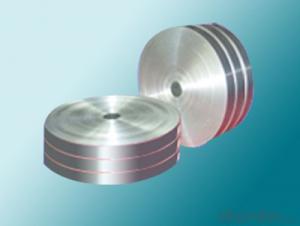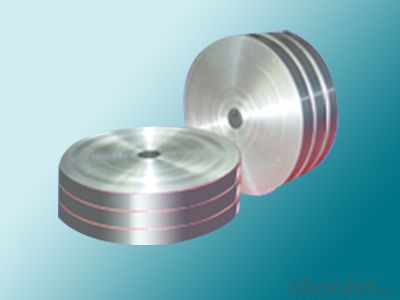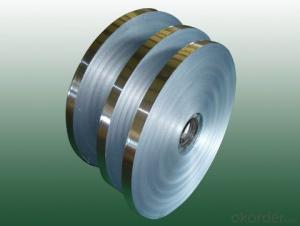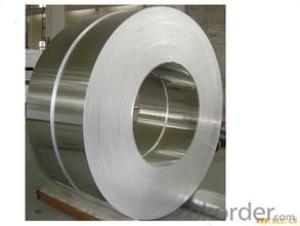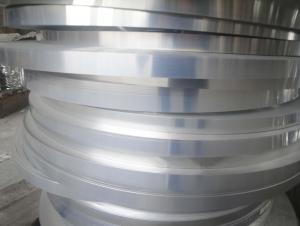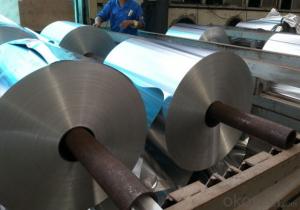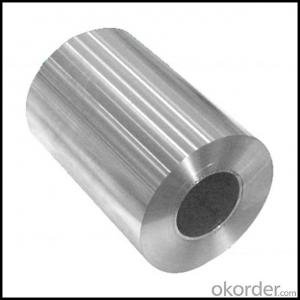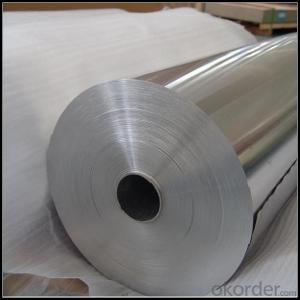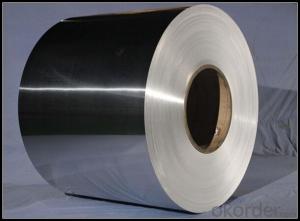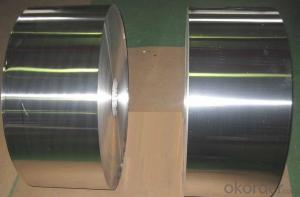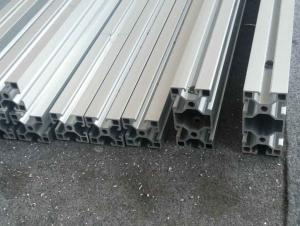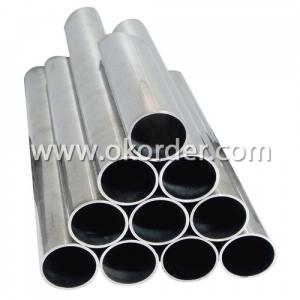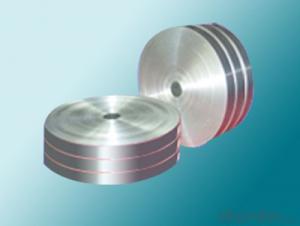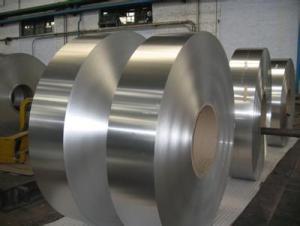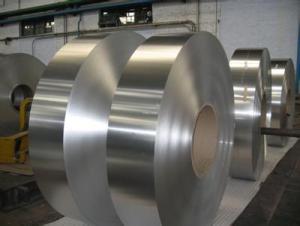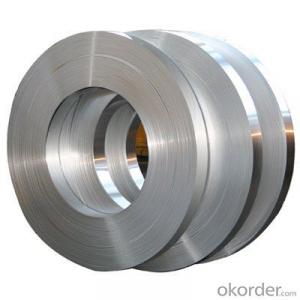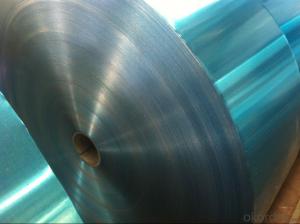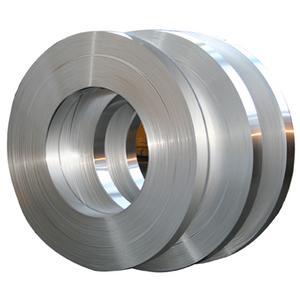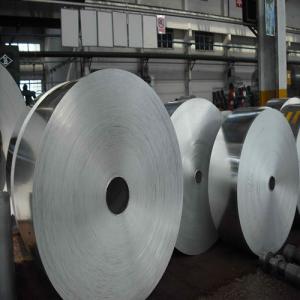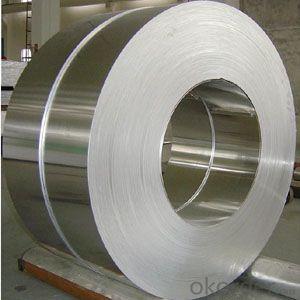Mill Finished Aluminum Profiles for LED Strips 8xxx
- Loading Port:
- China Main Port
- Payment Terms:
- TT OR LC
- Min Order Qty:
- -
- Supply Capability:
- -
OKorder Service Pledge
OKorder Financial Service
You Might Also Like
aluminum strips for transformer
alloy: 1050/1060 3003/8011
Thickness range: 0.15 to 0.6mm
Surface finish: washed by chemical water
Bright and smooth surface, without flow lines
Quality of material: totally free from defects like white rust, oil patches, roll marks, edge damage, camber, dents, holes, break lines, scratches and free from coil set
aluminum coil/strip for PEX-AL-PEX pipedata:
| Dimension(MM) | 0.20*49*C; 0.23*61.7*C 0.28*77*C; 0.35*99*C | Alloy and Temper | 8011 0 | Product | aluminum coil/strip | ||||||
| Techuique Standard | YS/T 434-2000 | ||||||||||
| Chemical Composition(%) | |||||||||||
| Si | Fe | Cu | Mn | Mg | Cr | Zn | Ti | Other | Al ≥ | ||
| | |||||||||||
| 0.50~0.9 | 0.6~1.0 | 0.1 | 0.2 | 0.05 | 0.05 | 0.1 | 0.08 | - | remainder | ||
| | |||||||||||
| Notice: Aluminum foil not contains Pb,As and other Virose elements. | |||||||||||
| Mechanical Property | |||||||||||
| Temper | THICKNESS | Strength(Mpa) | Elongation(%) | | |||||||
| 0 | 0.20mm; 0.23mm; 0.28mm; 0.35mm | 100~120 | 20% | | |||||||
Advantage:
1. Good quality,low price.
2. Short delivery time
3. Welding: Not allowed
4. Windings: No excessive run out of windings
5. Form of winding on coil:No ovalisation allowed
6. Camber: Aiming value ≤ 1mm/2.5m, Demand ≤ 2mm/2m
7. No Bur on Side edge
8. No wave on side
9. No oil stains,no wrinkle, on surface
10. Corrosion Resistant
- Q: Use of aluminium strips for aluminium strips
- 1060 requirements of corrosion resistance and formability are high, but the strength requirements are not high, chemical equipment is its typical use1100 for processing requires good formability and high corrosion resistance but is not required to have high strength parts, such as chemical products, food industry device and storage containers, sheet processing, deep drawing or spinning concave ware, welding parts, heat exchanger, printing plate, nameplate, reflective instruments3004 plates, thick plates, tensile tubes. For as long as extruded tube aluminum cans cans, requires much higher than the 3003 alloy parts, chemical products production and storage device, sheet processing, building baffle, cable conduit, sewer, various lighting components.
- Q: Is it possible to incorporate recycled materials into construction, specifically using aluminum strips for roofing?
- <p>Yes, you can use recycled materials in building construction. Aluminum strips are often made from recycled aluminum, which is a sustainable choice. Recycled aluminum requires significantly less energy to produce compared to new aluminum, reducing environmental impact. It's important to ensure that the recycled materials meet quality standards for construction and are sourced responsibly. Using recycled aluminum for roofing can contribute to a greener building project and help in waste reduction.</p>
- Q: What types of aluminum strips are more appropriate for industrial purposes?
- <p>Yes, there are specific types of aluminum strips that are more suitable for industrial applications. These include 1100 series aluminum strips, known for their high purity and excellent corrosion resistance. 3003 series strips are also popular for their good formability and weldability, making them ideal for applications like chemical equipment and aircraft parts. Additionally, 5052 series strips are valued for their strength and resistance to marine environments, often used in shipbuilding and offshore structures. Each type is chosen based on the specific needs of the industrial application, such as strength, malleability, and environmental resistance.</p>
- Q: What benefits does aluminum offer as a roofing material compared to other metals?
- <p>Aluminum strips for metal roofing offer several advantages over other types of metal roofing. They are lightweight and easy to install, reducing labor costs. Aluminum is highly resistant to corrosion, ensuring a long lifespan and low maintenance. It also reflects heat well, which can help keep buildings cooler and reduce energy costs. Additionally, aluminum is recyclable and can be produced in various colors, making it an environmentally friendly and aesthetically versatile choice.</p>
- Q: What are the safety regulations concerning the use of aluminum strips in construction?
- <p>Yes, safety regulations apply to the use of aluminum strips in construction work. These regulations vary by country and region but generally include adherence to material standards, proper handling and installation procedures, and compliance with electrical and fire safety codes. For instance, in the United States, the Occupational Safety and Health Administration (OSHA) sets guidelines for safe construction practices, which may include specific requirements for using aluminum strips. Additionally, the American Society for Testing and Materials (ASTM) provides material standards for aluminum strips used in construction. It is crucial to consult local building codes and industry standards to ensure compliance with all applicable safety regulations when using aluminum strips in construction projects.</p>
- Q: Can the high frequency of aluminum band replace the high frequency of professional high-power loudspeaker box?
- General band speaker power in 10-40W, home HIFI speakers can be used, professional environment will not work
- Q: What are the potential dangers or issues that could arise from using nails or screws to attach aluminum strips?
- <p>There are several risks involved with using nails or screws to install aluminum strips. These include damaging the aluminum strip by causing dents or cracks, especially if the material is thin. There's also the risk of stripping the screw hole, which can weaken the hold and cause the strip to come loose. Additionally, if the aluminum strip is not properly secured, it may lead to accidents or injuries due to falling or improper installation. Using the wrong type of fastener can also lead to corrosion or other material compatibility issues. It's crucial to use the appropriate tools and techniques to minimize these risks.</p>
- Q: What is the standard thickness for aluminum strip roofing materials?
- <p>The recommended thickness for aluminum strip roofing varies depending on the specific application and local building codes. Generally, aluminum strip roofing is available in thicknesses ranging from 0.018 to 0.032 inches (0.46 to 0.81 mm). For residential applications, a thickness of 0.024 to 0.028 inches (0.61 to 0.71 mm) is commonly used, while commercial buildings might require a thicker strip, around 0.032 inches (0.81 mm) for added durability and longevity. Always consult with a roofing professional or follow local building codes to determine the appropriate thickness for your specific project.</p>
- Q: This question asks if there are any potential health hazards linked to the use of aluminum strips.
- <p>There are some concerns regarding the use of aluminum strips, particularly in the context of cooking utensils and food packaging. Prolonged exposure to aluminum has been linked to potential health risks, including Alzheimer's disease, although the evidence is inconclusive. Aluminum can leach into food, especially in acidic environments, which may lead to increased aluminum intake. However, the FDA and other health authorities have not issued warnings about the use of aluminum cookware or food packaging, as the levels of aluminum typically ingested are considered safe. It's important to note that more research is needed to fully understand the potential health implications of aluminum exposure.</p>
- Q: Is it possible to utilize aluminum strips in environments with high temperatures?
- <p>Aluminum strips can be used in high-temperature environments, but their performance and longevity depend on the specific conditions and the alloy type. Pure aluminum has a melting point of 660掳C (1220掳F), but aluminum alloys can be designed to withstand higher temperatures. For instance, some aluminum alloys are used in aerospace and automotive applications where they experience high temperatures. However, prolonged exposure to high temperatures can lead to material degradation, so it's crucial to select the right alloy and consider the temperature limits specified by the manufacturer for the intended application.</p>
Send your message to us
Mill Finished Aluminum Profiles for LED Strips 8xxx
- Loading Port:
- China Main Port
- Payment Terms:
- TT OR LC
- Min Order Qty:
- -
- Supply Capability:
- -
OKorder Service Pledge
OKorder Financial Service
Similar products
Hot products
Hot Searches
Related keywords
